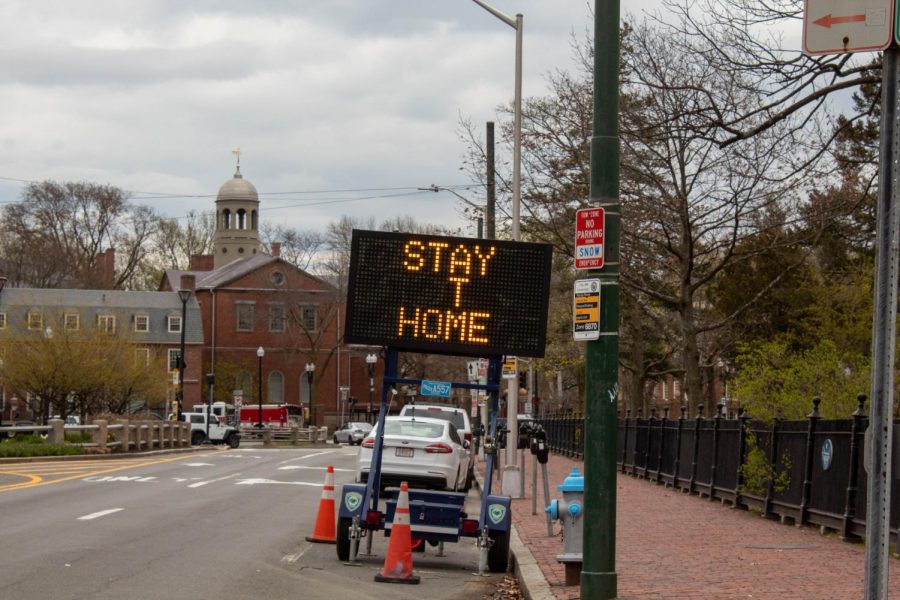Small Businesses in Cambridge, Adapting as Best They Can, Worry About the Future
Small businesses are getting some support from the government, but many business owners worry that it won’t be enough.
April 30, 2020
On March 10th, Governor Charlie Baker declared a state of emergency in Massachusetts, closing all non-essential businesses until at least May 4th. While this was a necessary measure for public health, many small businesses are worried about surviving these closures. As an attempt to help business owners stay afloat and stabilize the American economy, on Friday, March 27th President Trump signed a two trillion dollar stimulus package, $349 billion of which is designated for aiding small businesses.
The stimulus package offers several options for business owners in need, like grants for paid sick leave. The package also includes the Paycheck Protection Program, which gives eight weeks of financial assistance to businesses that keep employees on payroll throughout the pandemic. However, despite this government assistance, many small business owners don’t believe that it will be enough to get them through the crisis.
“I don’t think [the stimulus check] is going to help my business at all,” commented Virginia Johnson, owner of Gather Here, a community space and fabric store. “Small businesses are taking a hard hit right now and getting a loan doesn’t solve the lack of income during this time that we’ve all willingly sacrificed for the greater good.”
At the moment, Gather Here doesn’t have a GoFundMe or website to receive donations like some other stores do and is instead relying on their online store for income. “People in Cambridge have really come out and been great online,” wrote Johnson in an email to the Register Forum. “We were fortunate enough to already have the foundations in place for an online store, so we’re trying to just beef that up so we can continue serving the community. At this moment we think we can chug along on the online store for now, but I don’t know how long that will be enough for.”
So far Johnson has been forced to lay off 17 of her 25 employees. “I think it was the worst thing that I’ve ever had to do in my life,” Jonhson said. “There’s no end in sight. I don’t know if I’ll be able to rehire, and I don’t know if I’ll be able to pinch together the funds to keep my business alive.”
Right now, Gather Here is collaborating with the Boston Area Mask initiative. Every week they provide 500 masks to Cambridge Health Alliance and have designed a cloth mask with a filter pocket that is easy to make with a sewing machine. “I feel really good about this [initiative],” said Johnson. “We realize this isn’t a substitute for surgical-grade masks, but given the fact that actual health care workers are putting in requests for these we will continue to support them for as long as they need them.” A video tutorial and written instructions are available on their website.
Gather Here isn’t the only local business using its resources to help those in need during the quarantine. Pammy’s, a restaurant located in Central Square, is selling loaves of bread on their website and donating 50% of the proceeds to No Kid Hungry, a nonprofit focused on ending child-hunger nationwide. The other 50% is being used for their staff relief fund.
“There is so much risk, but we are too small to fail,” wrote Pammy Willis, the owner of the restaurant to the Register Forum. “So we just keep going into work, filing paperwork and waiting. Waiting for what? I’m not entirely sure. I’m scared, but I’m hopeful—because the people that surround me right now—my team and my guests, they are my lifeline. They are my relief.”
The Brattle Theater, a local nonprofit that has existed in Cambridge for 67 years, will most likely be one of the last businesses to reopen along with many other art organizations. “Our model is based on bringing people together,” explained Ivy Moylan, the artistic director at the theater, wrote in an email to the Register Forum. “The Brattle has weathered a lot since it became a cinema in 1953, but nothing like this. We really want it to still be standing when this is all over.”
Currently, Brattle staff are curating a variety of online film programs and have even started recording a podcast to provide entertainment to Cambridge residents. “The virtual programs that we are providing don’t have a money-making element but we feel like they are important as a way to get a little relief during such a stressful time,” wrote Moylan. “Donations from our community, as well as membership and gift card purchases, are going to be the key to our survival.” The virtual programs are available on their website.
At the moment there are many things Cantabrigians can do to help keep local businesses afloat. Moylan recommends continuing to shop, even if it is remotely, avoiding big box stores, and contacting the City Council to urge them to do everything they can to support local businesses.
“Someone said to me the other day that it’s a marathon. Actually, when you run a marathon, you know that there’s an end. We don’t have an end,” concluded Johnson. “I just think that the federal government has failed the main streets that they’re always talking about being really important to the fabric of our communities. I’m just a woman-owned business in Cambridge, Massachusetts, so right now it’s really scary.”











